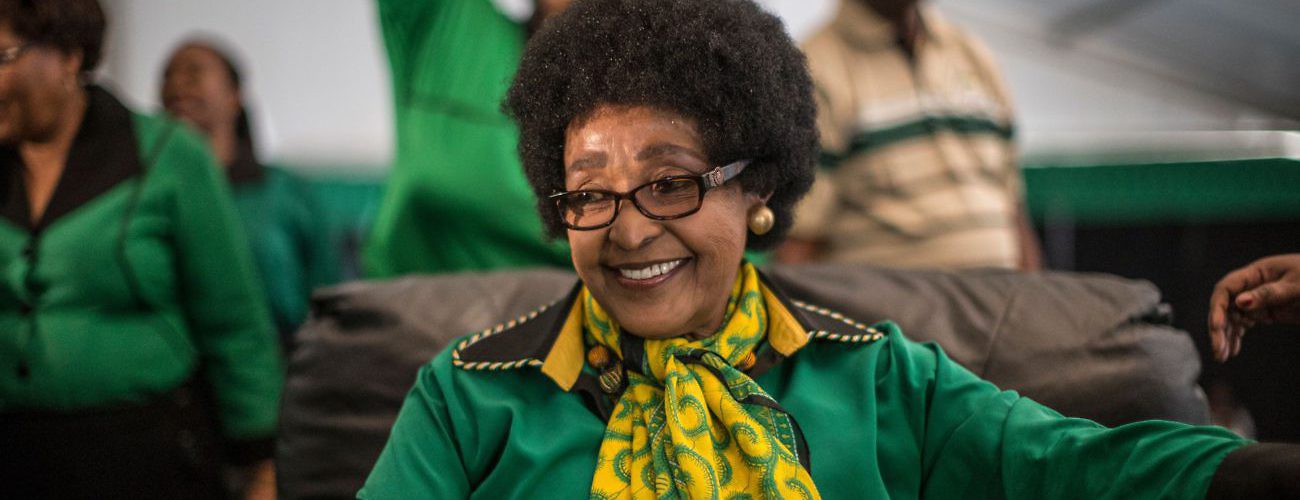Winnie Madikizela Mandela looks on as she is greeted by Women League supporters gathered in Soweto to celebrate her 80th birthday. (MARCO LONGARI/AFP/Getty Images)
Winnie Mandela, the estranged wife of South Africa’s first democratically elected president, Nelson Mandela, died at age 81 in a Johannesburg hospital on April 2 after a long illness. At the state funeral on April 12, Deputy President David Mabuza and a number of major figures in the anti-apartheid movement paid tribute to her important role and achievements, despite many controversies, in bringing about the end of apartheid, and contributing to the first truly democratic elections in South Africa in April 1994.
The Context of Her Life
South Africa was controlled for almost half a century by the apartheid regime’s Afrikaaner government established in 1948. The government, led by Jan Smuts, “legalized” the previously established racist practices dating back three centuries in a series of laws designed to relegate the black majority to exclusion from virtually all public life. Forced removals, arbitrary property confiscations, and compulsory resettlement to townships on the outskirts of Capetown, Johannesburg, and other cities under police and military rule became commonplace. Those resisting were physically attacked, many were killed in the Soweto riots and other protests. The African National Congress (ANC) leadership was imprisoned or forced into exile.
Founded in 1912, the ANC was accused of seeking to overthrow the government, fomenting terrorism, supporting Soviet Communism, and campaigning with international support for sanctions to block South Africa’s economic development for its white population. Its leaders Oliver Tambo, Thabo Mbeki, and others were forced into exile in Tanzania, Namibia, and elsewhere in Africa or abroad. In 1964, at the Rivonia Trial in Johannesburg, its main leader Nelson Mandela was sentenced to life imprisonment on charges of treason and sent to Robben Island, a few miles outside of Capetown. He was held there for 27 years in near isolation.
In 1988, under the pressure of international sanctions the government moved Mandela to Victor Verster Prison outside Capetown, holding him there in isolation and promising his release if he would give up the armed struggle. They thus hoped to arrange a soft landing for themselves before finally allowing a black majority government to be formed.
Her Struggle
This was the context for Winnie Mandela’s lifelong struggle, fighting to free her husband and enable him to resume his political activism, but looking further to the overthrow of the Afrikaaner government and the entire apartheid system. For almost three decades she suffered for her beliefs but never buckled. After being arrested in May 1969 she was held for 17 months, thirteen in solitary confinement where she was beaten and tortured. After the 1976 riots in Soweto she was imprisoned without trial for five months and then “banished” to Brandfort—a remote town in the Orange Free State—where she was separated from her two daughters and her comrades and kept in a small house with few visitors allowed.
Nonetheless famous anti-apartheid activists found their way to her house, including US Senator Edward Kennedy whose visit was shown on international television stations. In 1989 she was finally allowed to return to Soweto and subsequently reunited with Nelson Mandela at the time of his release in February 1990. When Nelson and Winnie decided to separate in 1993 it was partly due to her acknowledged affair with a younger ANC figure, and partly because of their different political visions of the future.
For the rest of her life Winnie Mandela remained an outspoken public figure. She was treated harshly by most of the mainstream media and many whites for her alleged role in fomenting violence against the regime and treating suspected informers severely. In 1991, she was convicted of ordering the 1988 kidnapping of James Seipei, known as Stompie Moeketsi, accused of being an informer for the secret police who was killed by her bodyguard and leader of the Mandela United Football Club. At her trial she was sentenced to six years for kidnapping, but South Africa’s highest appeals court reduced her sentence to fines and a one-year suspended term.
When she came to my house in March 1993 at the time I was Consul General in Johannesburg, she gave my wife and me a copy of her book “Part of My Soul” describing her struggles. Throughout our conversation she was focused on the future of the African majority. She remained committed to that struggle throughout her life. We will remember her as a person of great courage who worked for this greater cause throughout a very difficult life.
Ongoing Challenges
Winnie Mandela’s death closes an era. There is, however, no end of history, no final point for South Africa’s struggles. Almost a quarter century after Nelson Mandela came to power, South Africa continues to face many of the problems he confronted: pervasive poverty, profound social cleavages, the great divide between an empowered largely white minority and the great majority of the largely impoverished black population. Outgoing President Jacob Zuma is on trial for acts of corruption which have further weakened the national economy. President-elect Cyril Ramaphosa has to overcome the failings of his predecessors. He will have to reconcile conflicting imperatives of strengthening the economy and ending corruption and favoritism, while at the same time narrowing the social divide and providing significant new opportunities for the next generation of African youth.
In closing his eulogy at her interment on April 14, President Ramaphosa said:
“She lives on in the nation that called her ‘Mama’‚ as it strives each day to fulfil its destiny as a united‚ peaceful‚ prosperous and just society.
Nomzamo Winnie Madikizela-Mandela has died‚ but she is not gone.
She lives on in all of us. She inspires our actions.
She guides our struggles. She remains our conscience.
May her soul rest in eternal peace. May her spirit live forever.”
John Hirsch is a Senior Adviser at IPI and a former US ambassador to Sierra Leone.





